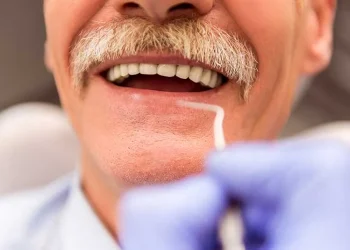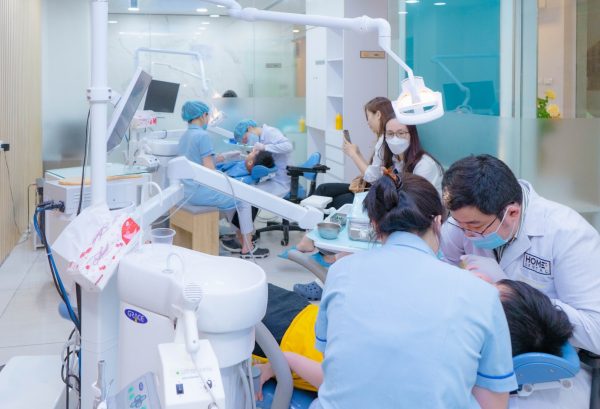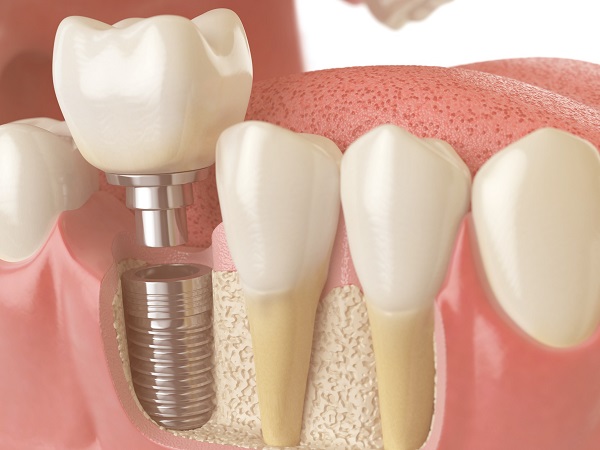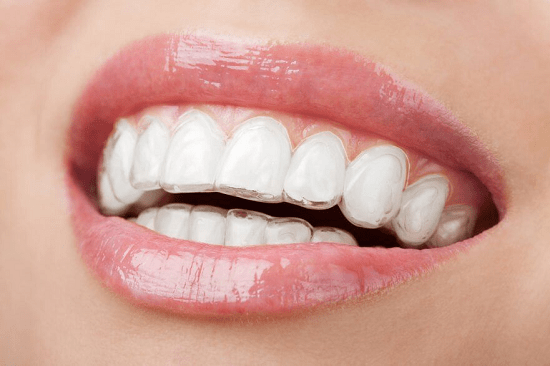Contents
- 1 Dental Implant procedure according to German standards
- 2 What is Dental Implant?
- 3 What are the benefits and drawbacks of Dental Implant?
- 4 The German standard Dental Implant procedure
- 5 Advantages of the German Standard Dental Implant Procedure
- 6 Who is eligible for Dental Implants?
- 7 Notes before and after the Dental Implant procedure
Dental Implant procedure according to German standards
What is Dental Implant?
Dental Implant is a modern tooth restoration method in which the artificial roots or Implant posts are firmly attached to the jawbone. This method has the effect of replacing lost teeth, supporting crowns to help you regain the ability to eat and chew.
Normally, an Implant tooth will consist of 3 main parts:
- The post: made of Titanium, acts as a tooth root to support the Implant tooth. The post will be placed inside the jawbone
- The crown: placed on top of the post. The Implant crown has the exact same shape, size and color of the real tooth.
- Abutment joints: connector joints that connect the Implant post and the crown so that the teeth do not shift or wobble in the mouth.
After the procedure, people who have lost teeth and receded gums have their teeth and gum recovered, resulting in recovering chewing function. At the same time, they will also regain the natural beauty of their teeth and smile.
What are the benefits and drawbacks of Dental Implant?
Dental Implant is the most advanced and popular cosmetic dental method nowadays. It is also the first choice of many patients in order to have an aesthetic smile. To know more about this impressive method, let’s learn more about its advantages and disadvantages.
Advantages of Dental Implant
Some of the Dental Implant extraordinary advantages are:
- Help restore lost teeth in a comprehensive way in terms of chewing ability and aesthetics.
- Prevent the process of jaw bone loss, as the missing teeth are replaced by Implant teeth.
- All operations only take place on the missing teeth without affecting the adjacent teeth
- With proper care, dental implants can last up to 20 years or even a lifetime.
Disadvantages of Dental Implant
Besides the advantages Dental Implant has that satisfied many patients, the it also has many potential risks:
- If the dentist places the post in the wrong position, the tissue around the implanted tooth is affected.
- During the surgery, careless handling allows foreign bacteria to enter to cause local or systemic infection.
- Bleeding occurs when the doctor makes an incision in the gums and inserts the post into the jawbone. However, after about 1-2 hours, the bleeding will stop.
To minimize the risks that occur during the implantation process, you should choose a reputable dental center, and at the same time take care of your oral health.
The German standard Dental Implant procedure
The German standard Dental Implant procedure is a five-stage process.
Step 1: Overview and consultation:
Before you choose to do Dental Implant, you should conduct an overview of overall your health as well as your dental health. Through the 3D CT Scanner, the doctor will understand the structure, quality of the jawbone, and the position of the teeth that are missing. At the same time, conduct some tests to see if you are healthy enough.
Step 2: Carry out the Dental Implant procedure:
Your doctor will examine you again to make sure your health is stable. Before the surgery, you will be anesthetized to minimize pain. The process of placing the post takes place quickly, within about 7-10 minutes.
In this process, the post is placed into the jawbone. It is made of titanium and is surgically placed into the bone. The post is then left to integrate with the bone for several months.
Step 3: Take dental impressions and attach temporary teeth:
After about 2-3 days of implantation, you should return to the dental facility so that the doctor can take your dental impression to make a temporary tooth. The doctor will use an impression tray to take your dental impression. Then the temporary will be manufactured based on this impression. After that, your doctor will install that temporary tooth, which is convenient for you in your everyday activity, especially in your eating process.
Step 4: Re-examination after Implant:
After about 7-10 days, the doctor will make an appointment for you to come back for a follow-up visit to check the healing of the gums.
Step 5: Attach the porcelain crown on the pillar and fix:
When the jawbone and post are firmly attached, the post is uncovered, and an abutment is attached to the post. An abutment is a joint that connects the implant to the crown. The doctor will proceed to attach the crown using this connector. Once completed, you will be consulted and guided by your dentist to take care of your teeth at home.

Advantages of the German Standard Dental Implant Procedure
The German standard Dental Implant procedure has several outstanding advantages. Firstly, the procedure has a high success rate. According to research, it has a success rate of over 95%. Therefore, patients are certainly guaranteed safety when using this method.
Secondly, the procedure is minimally invasive. This means that the patient experiences less pain and discomfort during and after the procedure. This also minimizes the chance of infection, inflammation or complication that can happen during the surgery.
Thirdly, the procedure is quick, and the recovery time is short. The patient can continue their normal activities within a few days after the procedure. Thus, it can be said that this procedure has improved patients’ life quality.
Who is eligible for Dental Implants?
The Dental Implant method can be applied in most cases of missing teeth. Therefore, people who have lost one tooth or many teeth can completely restore their tooth shape in this way, as long as they meet the following criteria:
- Persons of 18 years old or older, without chronic diseases or dental diseases, in stable health. If you have any disease, you should completely cure it before having a dental implant.
- People with fully developed molar structure.
- Mentally stable, not addicted to stimulants related to alcohol, tobacco or cigarettes.
It is important to note that the Dental Implant procedure may not be suitable for everyone. Patients with certain health conditions, such as people with diabetes or heart disease, are not suitable for the procedure. Moreover, patients must have sufficient bone density and healthy oral condition to support the post. Therefore, it is important to consult with a qualified dentist to determine if this procedure is the right choice for you.
Notes before and after the Dental Implant procedure
Before the Implant procedure
Tell your doctor about your health condition
In addition to a general examination before the procedure, you should also tell your doctor about the medical condition you are having and the medications you are taking. This will help the doctor anticipate possible risks, thereby taking timely preventive measures.
Choosing the right Implant post
Choosing the right type of post will help you restore the tooth shape quickly, reducing the waiting time for integration between the jawbone and the post. Each type of post will have its advantages and disadvantages as well as different prices. You should consult with your doctor to choose the type of post that is best for your oral health.
Fasting
During the procedure, your doctor may use anesthesia on you. Therefore, fasting for about 6 hours before the procedure will help your stomach feel more comfortable.
Mental preparation:
Although Dental Implant is a surgical procedure, it is often safe and effective. The success rate of this procedure is very high so you don’t need to be scared or worried. Instead, you should prepare yourself as comfortably as possible, avoiding the stress that may affect the doctor’s operation.
After the procedure
After the dental implant procedure, proper aftercare is essential to ensure the success of the procedure. The patient must maintain good oral hygiene practices, such as brushing and flossing regularly. The patient must also avoid smoking and consuming alcohol and must follow a healthy diet to promote healing.
These are the dos and don’ts you should pay attention to:
Dos:
- For at least a week after the treatment, only eat soft foods
- Keep good hygiene
- As your doctor give you a recommendation about the type of mouthwash you should use, rinse your mouth 3-4 times a day
- Take medicines according to the doctor’s prescription.
Don’ts:
- Eat hot or cold food and drinks
- Use straws to drink
- Do labor work only a few days after the treatment
- Heavy exercise
- Use your finger or your tongue to touch your implant
- Drink alcohol
- Smoke
- Wear dentures that cover the implant area
In conclusion, the German standard Dental Implant procedure is an advanced and successful implantation procedure. Before deciding to choose this procedure, patients should consult with a qualified dentist in order to know if they are eligible for Dental Implant, what type of post to choose and other health problems. After the procedure, pay attention to the aftercare to health quickly and safely.

To experience a high quality treatment service that meets the German standard, visit Home Dental, the only German standard dental clinic in Ha Noi. At Home Dental, you are greeted by dedicated care and treated by skilled doctors. Home Dental is a dental clinic trusted and chosen by many customers. If you want to learn more about Dental Implant, or to book an appointment, contact 091 466 56 56 for support.















